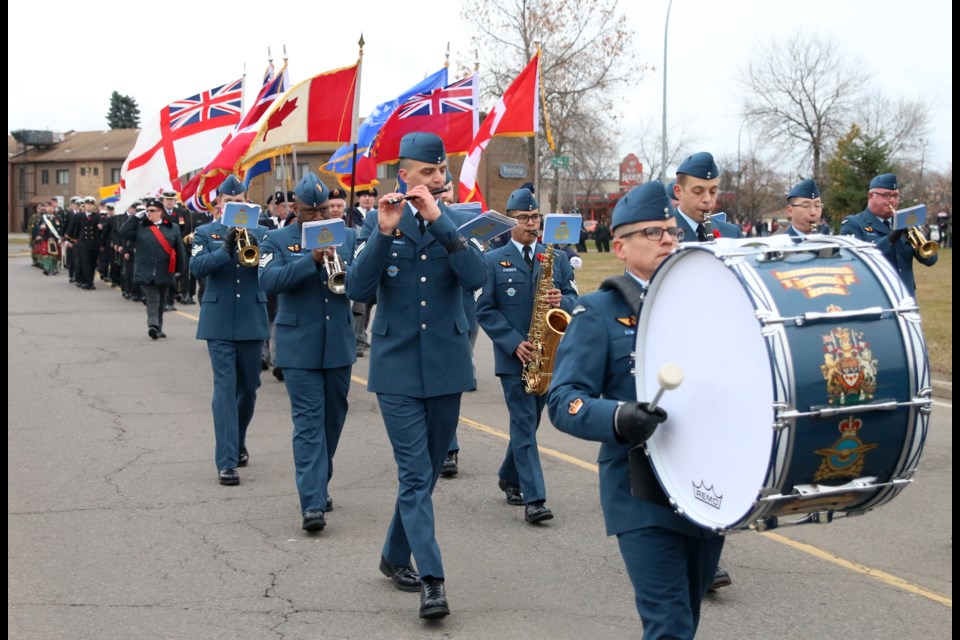THUNDER BAY - In 1915, young men marched down city streets toward an uncertain future. More than 100 years later, service men and women were once again marching through the city of Thunder Bay to honour those soldiers of the Great War who marched before them so long ago.
As part the commemoration to mark the upcoming 100th anniversary of the end of the First World War, a military parade was held on Sunday, capping off a weekend of events and tributes.
“This has been a community effort,” said Michel Beaulieu, a member of the poppy steering committee. “This is something that began four years ago. A number of community organizations within the city of Thunder Bay began to look for ways to commemorate the armistice and the sacrifices that individuals had made, but also what the First World War meant to the development of Canadian society.”
The parade included members from all military and cadet units in Thunder Bay and Beaulieu said the city has not seen a parade of this size in quite some time.
“It’s been a while since a parade has featured all the various units in the city,” he said.
Beginning at the Thunder Bay Community Auditorium, the service men and women marched down Memorial Avenue and retuned to the Auditorium for speeches from dignitaries, musical performances by the Royal Canadian Air Force Band, and the premiere of the locally produced film, Where the Poppies Grow: The Lakehead at War.
The film by Ron Harpelle and Kelly Saxberg tells the story of how the people of Port Arthur and Fort William were impacted by the war, both on the battlefields in Europe and on the home front, through a series of letters.
Other events this weekend included an open house at the O’Kelly V.C. Armoury and a gala ball for the launch of the book, Thunder Bay and the First World War: 1914-1919.
“This has been a labour of love for all those involved,” Beaulieu said. “Many of the individuals who were involved in the steering committee and the organizations were themselves, to various levels, in the Canadian Armed Forces. Many other individuals are members of the community and this is our way of recognizing those who have sacrificed before, those who have contributed before, but also a recognition of those within the city who do serve our country.”
Retired Rear Admiral, Ray Zuliani, said the people of Fort William and Port Arthur made significant contributions to the war effort, from the young men and women who served in Europe, to those on the home front who worked in the shipyards and endured years of rationing.
“It’s only right and fitting since there is no one left alive from that war that we mark that occasion,” he said. “It was supposed to be the war to end all wars. It didn’t work out that way. We are trying to bring that awareness to people that the sacrifices that those people from Thunder Bay made should not be forgotten.”
Zuliani added that Thunder Bay being the city where the poppy was chosen as the symbol of remembrance is also something the city should take pride in.
“I think that is pretty significant in terms of not just Canada, but world-wide the poppy has become known for remembrance and it happened right here in Thunder Bay and we are really proud of that,” he said.
The parade and tributes on Sunday also served as a lead-in to Remembrance Week, which concludes on Remembrance Day that will mark the 100thanniversary of the signing of the armistice on Nov. 11, 1918 that ended the First World War.
Beaulieu said the commemorations are meant to serve as a point of reflection and with 100 years now passed since the end of the Great War, it is important to remember all those who marched into history, and never forget those who did not return.
“There are no living veterans of the First World War left, so one of the things we’ve been doing as community organizations and groups is trying to listen to their voices through diaries, memoirs, family stories as a way of keeping their memory alive, but also keeping a live what is a significant point in Canadian history,” he said.
